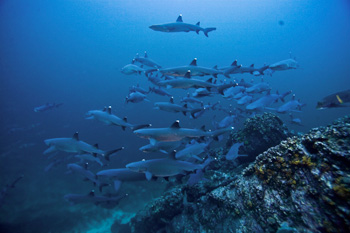With no thanks to Spielberg's 1975 American thriller, the cult classic, Jaws, the mere mention of sharks is enough to clear a beach. Sharks are of the most misunderstood species on the planet. This marine genus has been branded with a terrifying image and an eerie theme song to boot. So, ever wonder what is lurking beneath you as you wade in the waters of Nosara's and Samara's beautiful beaches?
Based on the number of surfers confidently riding the waves on any given day, one might deduce that the existence of predacious marine life in the area was…well, non existent. Wrong.
|
|

Photo by Cristiano Paoli |
According to local biologist and marine life enthusiast, Felipe Lopez, who spends a great deal of his professional and personal time on and under the water, there are sharks in the water, and it's a good thing.
"Sharks are actually a sign of a healthy eco-system, wherever you see sharks you see balance, I always look at them as a good sign, I have seen many sharks while diving around Nosara" said Lopez.
Now, don't pack up your swim trunks and surfboards just yet. According to Lopez the sharks inhabiting these waters are hardly a human threat. There has yet to be a recorded shark attack in the waters of Guiones and Pelada.
Captian Eduardo Carrillo, a local fisherman has been living and working in the area for more than 25 years, said that the only shark attack he recalls happened in 1985 at Punta Guiones when a tiger shark killed a young fisherman. The local fisherman and scuba guide was with a group searching for lobsters when he was attacked.
"This was definitely a freak accident," said Carrillo. "I have spent most of my life in and an on the water and I have a great respect for sharks. Nosara is not a place that you need to worry about shark attacks."
Though both Lopez and Carrillo, along with other local fishermen and divers, have spotted tiger, bull and even whale sharks in the area, these sightings are rare in comparison to the sightings of a little known shark referred to as the white tipped reef shark.
White tipped reef sharks are a small breed, rarely exceeding 1.8 meters (5.2 feet) in length. The species may be easily identified by, as its name suggests, the white tipped dorsal fin. They are the most common sharks found in the Indo-Pacific coral reefs and typically reside in clear water at depths of anywhere from 5-40 metres (20-130 feet). Reef dwelling creatures, like the white tipped reef shark, are ideal indicators of changes under the water and can act as a sort of thermometer for global warming. They live in and feed from reefs, which are heavily monitored for signs of climate change.
Ilena Zanella is a marine biologist with Mision Tiburon. Mision Tiburon is a non-profit organization that promotes conservation and responsible use of marine resources, particularly of sharks. Zanella, without hesitation, informed VON that white tipped reef sharks are hardly a threat to the average beachgoer or surf fanatic.
"These sharks are dormant during the day, only hunting at night. Even then, human is NOT on the menu," said Zanella. "There has never been a recorded incident of a white tip attack on a surfer or a swimmer, they are docile and passive creatures."
To the contrary, as Lopez reminds us, humans are a much greater threat to sharks than the reverse.
"Whether it is lack of education, new bacteria and illnesses caused by pollutants, non-selective fishing methods or new fads like shark finning, there is no doubt that humans pose a much greater risk to sharks than sharks do to humans," said Lopez.
Lopez encourages anyone who visits Nosara to strap on a mask and a snorkel and explore the lively waters of the area.
"Just remember that these are wild animals, and that if you respect them, they will do the same," said Lopez.
Shark Finning
Home to the largest fishing fleet in the hemisphere, and lax international fishing and trade regulations, Costa Rica has become intricately linked to the shark fin trade.
The white tipped reef shark is especially vulnerable to the threat of shark finners. They can usually be found in larger concentrations, which makes fishing them easier.
Shark finning along Costa Rica's pacific coast poses a serious problem for shark populations in the region. Shark fins are highly valued in certain Asian countries such as China and Taiwan where shark fin soup can cost upwards of $100 per serving.
While fishing for sharks is legal, it is against Costa Rican law to remove the fin of a shark and dispose of the rest of the animal. Lopez said that because of the high price for shark fins and the low price for shark meat local fishermen can not afford to bring the body of the sharks they catch back to land. It is much more lucrative to simply fin the sharks they catch. |
| 
